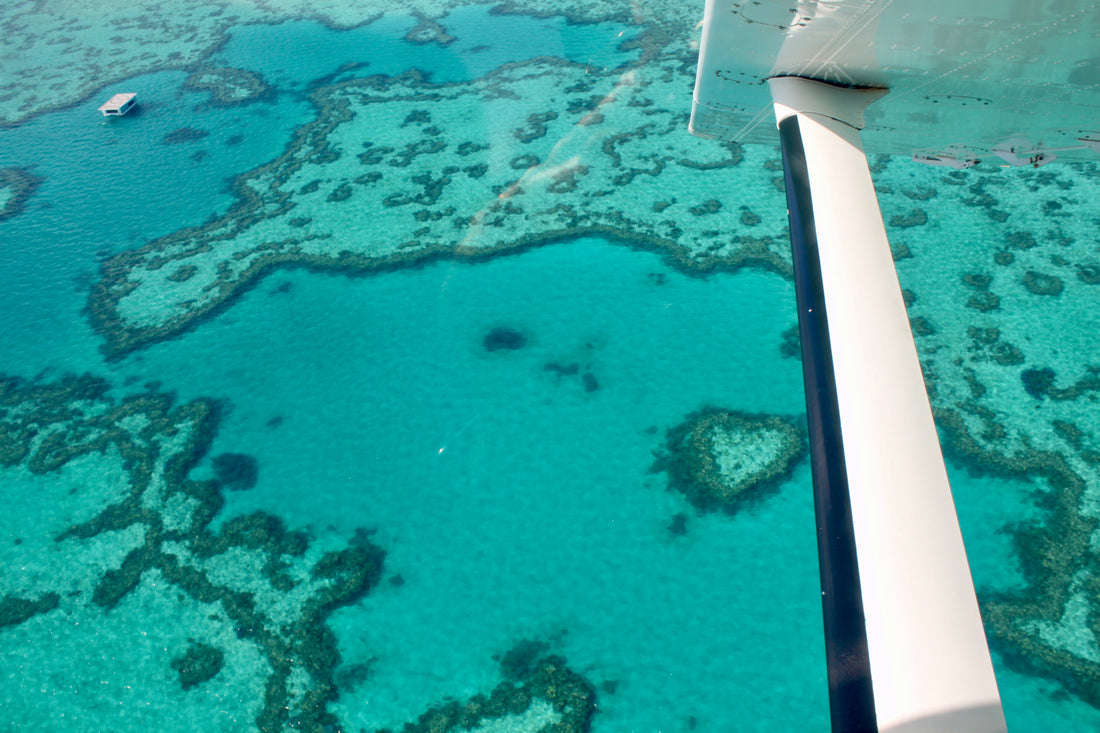Coral reefs, jewels of the oceans, are in serious danger. The chemical sunscreens that we use to protect ourselves from UV rays contribute to the deterioration of these fragile ecosystems. In this brief introduction, we'll explore the impact of these products on coral reefs and discover why alternatives such as French organic sunscreen products are a sustainable solution to this pressing problem. Join us to understand the urgency of the situation and the actions you can take to protect these precious underwater treasures.
Why are coral reefs in danger from chemical sunscreens?
Coral reefs, these underwater gems of incredible diversity, are facing a growing threat: the chemical sunscreens we use to prevent sunburn during our beach getaways. In this section, we'll dive into the heart of the problem to understand how these products can compromise the survival of coral reefs and all the marine life that depends on them.
The vulnerability of coral reefs
Coral reefs, nicknamed the "rainforests of the seas", are among the most diverse ecosystems on the planet. They are home to a multitude of creatures, from the smallest to the most imposing. Yet despite their natural resilience, coral reefs are extremely vulnerable to a range of threats, including climate change, pollution and overfishing. And now, chemical sunscreens are added to this list of dangers.
The role of sun protection in the ecological drama
The major problem lies in the ingredients of chemical sunscreens. The products we put on our skin to protect ourselves from UV rays often contain chemical filters such as oxybenzone, octinoxate and octocrylene. When we swim, these products are literally washed off our skin and end up in the ocean. The threat becomes particularly serious in areas where many swimmers gather, particularly tropical tourist destinations.
Impact on marine fauna
These chemical UV filters have become omnipresent pollutants in the marine environment. They have devastating effects on underwater life, affecting various organisms including corals, fish, crustaceans and marine mammals. Oxybenzone and octinoxate, in particular, have been identified as endocrine disruptors, meaning they interfere with the hormones of marine animals.
Coral bleaching
One of the most serious consequences of exposing coral reefs to these chemical filters is coral bleaching. When water temperatures rise, partly due to climate change, corals expel the symbiotic microalgae that give them their vibrant colors. This process weakens corals and can lead to their death. In addition, chemical sunscreens act as additional bleaching agents for corals, accelerating the phenomenon.

An alarming phenomenon
Coral bleaching is an increasingly worrying phenomenon. Corals are fragile organisms, and even slight increases in temperature can significantly affect them. The latest bleaching event, which began in 2014 and continued through 2017, was the longest and most destructive on record, affecting reefs in the Pacific, Indian and Atlantic Oceans.
Impacts on the food chain
In addition to the immediate consequences on coral reefs, bleaching has a cascading impact on the entire marine food chain. Fish and other creatures that rely on corals for food and shelter also suffer. This can disrupt the balance of marine ecosystems and compromise the food security of millions of people who depend on seafood.
It is essential to understand how chemical sunscreens contribute to the coral reef crisis. In the next section, we'll explore reef-friendly alternatives, with a focus on French organic solar products that offer a sustainable solution to this growing problem.
The Role of Chemical Sun Protection
Chemical sunscreens, widely used around the world, have become essential accessories for many people wishing to protect themselves from the harmful effects of the sun. However, there is growing concern about their excessive use and impact on coral reefs.
Understanding Chemical Filters
Chemical sunscreens contain chemical filters that work by absorbing the sun's ultraviolet (UV) rays. These filters are designed to protect the skin against the harmful effects of the sun, including sunburn and the risk of skin cancer. However, it is important to understand that these chemical filters can have unintended consequences when they reach marine ecosystems.
Commonly Used UV Filters
Chemical sunscreens use various UV filters, including oxybenzone, octinoxate, octocrylene and avobenzone. These chemical compounds absorb UV rays and convert them into heat, protecting the skin from the harmful effects of the sun. However, when these chemicals enter the water, they can have a devastating impact on coral reefs.
The Harmful Impact of Chemical Sun Protection on Coral Reefs
When swimmers, divers and water sports enthusiasts use chemical sunscreens, some of these products are inevitably released into the water. Several factors contribute to the negative impact of these chemical filters on coral reefs.
Toxicity to Corals
Several studies have shown that certain UV filters, particularly oxybenzone and octinoxate, are toxic to corals. They disrupt essential biological processes in corals and weaken their resistance to diseases, pathogens and environmental stresses.
Call to action: To reduce the impact on coral reefs, opt for sunscreens without oxybenzone and octinoxate.
Coral Discoloration
Chemical filters can cause coral bleaching, a phenomenon that significantly weakens the resilience of reefs. Discoloration often results from stress on corals, and oxybenzone is a common trigger. Bleached corals are more vulnerable to disease and death.
Disturbance of Marine Ecosystems
In addition to corals, chemical sun protection can disrupt all marine ecosystems. They can harm marine wildlife, including fish, molluscs and other marine organisms, by interfering with their development, reproduction and behavior.
Legislation and Restrictions
With growing concern about the impact of chemical sunscreens on coral reefs, some regions of the world have begun to pass legislation to restrict the use of these products. For example, Hawaii banned sales of sunscreens containing oxybenzone and octinoxate.
The Sustainable Solution: French Organic Solar Products
While chemical sunscreens have raised concerns about their impact on coral reefs, French organic sunscreen products are emerging as a sustainable and environmentally friendly solution.
Understanding French Organic Sun Products
French organic sunscreen products stand out for their environmentally friendly composition. They eschew potentially harmful chemical filters in favor of mineral filters such as zinc oxide and titanium dioxide. These mineral filters reflect sunlight instead of absorbing UV rays, providing effective protection without the drawbacks of chemical filters.
Concrete example: A French organic sunscreen brand, respecting these principles, uses mineral filters to protect the skin while minimizing its impact on coral reefs.
Commitment to Sustainability
French organic solar products also stand out for their commitment to sustainability. The manufacturers of these products strive to minimize their environmental footprint by using recyclable packaging, ingredients of natural origin and practices respectful of biodiversity.
Case in point: A French solar company sources ingredients from local suppliers, boosting the regional economy while reducing carbon emissions from transportation.
The Effectiveness of French Organic Solar Products
A frequently asked question is the effectiveness of French organic sunscreen products compared to their chemical counterparts. These products provide effective sun protection, and numerous tests confirm their ability to protect the skin against harmful UV rays.
Call to action: Opt for French organic sunscreen products to protect your skin while contributing to the preservation of coral reefs.
Support the Local Economy
By using French organic solar products, you support the local economy and French industry. This contributes to job creation and strengthening local communities while promoting sustainable practices.
Encourage Change
The adoption of French organic sunscreen products as a consumer sends a strong message to manufacturers and the beauty industry. This encourages more brands to develop environmentally friendly solutions and invest in the protection of coral reefs.
In conclusion, the impact of chemical sunscreens on coral reefs is a major concern for the health of our oceans and our planet. Coral reefs, jewels of marine biodiversity, face serious threats, including bleaching due to climate change. However, it is reassuring to see that sustainable solutions are within our reach.

